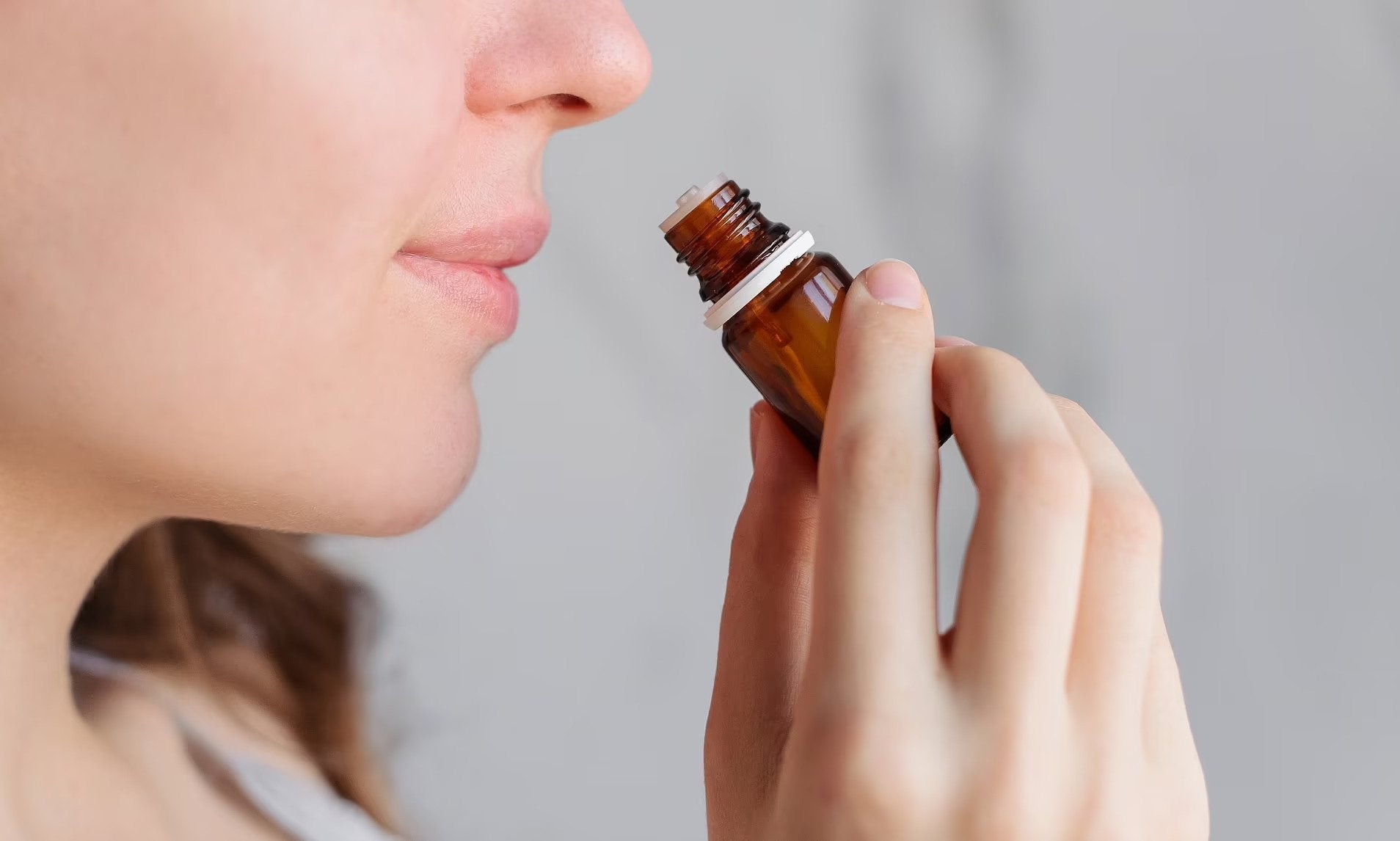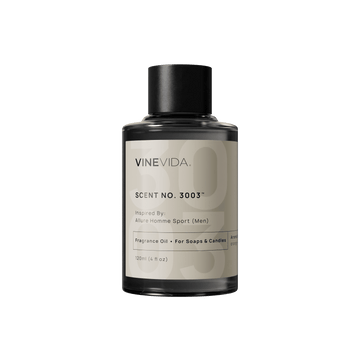When we inhale essential oils, or indeed encounter any fragrance, we take molecules into the body via two routes.
First, as we inhale, molecules are taken down into the lungs. From there, they travel into ever smaller pockets of the bronchioles and alveoli. They diffuse through the walls of the lungs via tiny capillaries. Now in the bloodstream, they can travel around the body, to the parts that need them, and up to the brain.
Second, they journey up the nose to the brain. Molecules enter the nostrils, adhere to the mucous membrane, and are filtered and cleaned. They travel up the nose to an outcrop of the brain called the olfactory bulb.
This dime-sized strip of tissue is rich with around ten million receptors. When molecules adhere to it, they interact with one or several, then send information to the limbic system.
What Does The Limbic System Do?
One of the most evolved parts of the brain, the limbic system controls memory, learning, emotions, cognition and appetite. Also known as “The Emotional Brain”, it directly connects to brain structures controlling heart rate, blood pressure, breathing, memory, stress levels, and hormone balance.
Odors trigger nervous system responses. Smoke, for example, activates the fight-or-flight response in the sympathetic nervous system. This notifies the brain of impending danger.
Lavender calms both the mind and body. This is partly because GABA and serotonin activate the parasympathetic nervous system. This system’s job is to remind the body to rest and restore.
Fragrance Encourages The Nervous System to Express Neurotransmitters
Scientists have now also discovered that the body expresses neurotransmitters when it perceives fragrance. When the body makes more GABA, it inhibits excitable brain signals, thereby decreasing nervous system activity.
We feel calmer, and GABA even plays a part in reducing pain.
Some olfactory receptors co-express, so they can secrete other molecules as well as GABA. Inhaling essential oils, like lemon, for example, can encourage serotonin, the body’s mood modulator.
In addition to mood, though, the body uses serotonin for around thirty other bodily functions, including digestive motility. People who have IBS will likely recognise the effects of stress when it disturbs serotonin, then makes their bowel movements problematic. It is a precursor to melatonin, which controls sleep and wake cycles, and is also involved in appetite. Inhaling essential oils like lavender or lemon, which affect serotonin, not only balance mood, but also have the capacity to affect all of these situations.
Inhaling Essential Oils Alters Our Brain Waves
In a Thai trial (Sayorwan, 2013), subjects who had inhaled rosemary essential oil reported feeling fresher, and were proven to have become more active. But what exactly did the scientists see?
The study measured the oil’s effect on the subjects’ brain waves. When the brain displays prominent alpha waves on an EEG, it suggests the participant feels relaxed and that their brain is idling, not really concentrating on anything. Beta waves are characteristic of a mind that is very engaged in something. Beta waves dominate when we debate, exchange ideas, chat, or teach.
EEG analysis showed that the power of both alpha 1 and alpha 2 waves was reduced, and the beta waves were enhanced by inhaling the rosemary.
Another trial (Masago, 2000) showed that both lavender and chamomile oils significantly changed Alpha 1 brain wave activity. However, the results showed a more hidden element. The effects seemed to rely on how comfortable someone felt when they smelled it. The more comfortable they felt, the better the results.
We also know that contextual memory may affect outcomes. Whilst lavender is the textbook relaxant, effects may be altered if the smell brings back some kind of painful memory. This is an important aspect of aromatherapy. Healing through inhaling essential oils tends to be much easier if the client has pleasant fragrance associations.
Some Essential Oils Might Not Be Analgesic
Not in the traditional sense, we perceive them as taking pain away, at least. Research done by the Florida Research College of Dentistry showed that the quality of pain was not altered when subjects were inhaling essential oils, but their perception of the pain did.
In other words, they perceived their wounds hurting less, even though nothing else had changed. The change was entirely in their mind. This is extremely useful information for people who are doing operations or who have undergone surgery.
Pain perception is predominantly registered in two main brain structures: the insular and anterior cingulate cortex. Linalool, of course, is a prominent constituent of lavender and is present in lesser amounts in rosemary essential oil. A study, done in Japan (Ota, 2017), proved that inhalation of linalool affected blood flow to this area of the brain.
It would be naive to say all the benefits are down to just one molecule. Indeed, essential oils are often composed of hundreds of natural chemicals. Each interacts with its own corresponding. We can see how an essential oil may not have side effects, but it has an unparalleled capacity for many actions.
Taking Inhaling Essential Oils Further
The benefits of pain sufferers inhaling essential oils should be obvious. However, we also know of several other things this region of the brain does. It helps us decide how we allocate our attention to things, as well as making ethical and moral decisions.
Recent studies point to this region also being involved in unconscious decisions we make around being motivated to do something. The ACC assesses how much effort something will be and whether the outcome will be worth it.
It holds data on the historical successes of past actions. Then it is responsible for how we anticipate rewards coming to us. These are key determinants of how hard we work at making something happen. The ACC has the final say so about whether we switch behaviors or carry on acting the same way we have been
This might also, in part, explain why inhaling essential oils like black pepper may be useful for alleviating smoking cravings, and how vanilla oil satisfies sugar cravings.
Inhaling Essential Oils During Hormonal Crisis
Our bodies suffer a number of hormonal disturbances and imbalances throughout our lives. These can be made worse by any number of factors, from stress to environmental pollutants. Often, though, they are part of daily life.
Statistically, three out of four menstruating women suffer from premenstrual syndrome. Additionally, more than three quarters of women feel that menopause has interfered with their lives.
One study (Choi, 2014) showed that inhaling a 0.5% dilution of neroli essential oil improved all symptoms of menopause, including mood, memory, and vaginal dryness.
An Iranian study (Heydari, 2018) showed that inhaling rose essential oil for five minutes, twice a day, during the five days surrounding ovulation, reduced premenstrual symptoms.
Some Arcane Effects of Inhaling Essential Oils
In 2020, it was revealed that scientists had proved that the antihyperalgesic properties of inhaling Cedrus atlantica essential oils were down to its interaction with the endocannabinoid system. It seems likely that this also explains the deep sense of calm and reverence the oil brings.
Unlike copaiba and black pepper, which affect the CB2 receptor, because of their high concentrations of beta caryophyllene, cedarwood interacts with both CB1 and CB2 receptors.
Ever since Raphael Mechoulam first elucidated that it was the CB1 receptors in the brain that interact with THC in Cannabis to bring about the “Bliss Effect”, scientists have been searching for other botanicals that might be able to do the same thing. CB1 receptors are found in the spinal cord and brainstem, and modulate learning, cognition, memory, appetite, pain, nausea, and itching. CB2 receptors are mostly found on blood and lymphatic tissues and modulate immunity, inflammation, and pain.
So, when you reach for a bottle of essential oil this week, ask yourself, Do I need to put it on my skin? Might a drop into a diffuser or an aromapendant be a better option? Would sitting for five minutes and inhaling essential oils work just as well? However you choose to administer them, enjoy using your bottle of oil from Vinevida.













